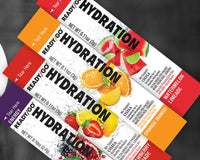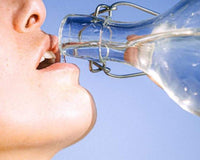The sweltering summer solstice is upon us, and with it, a barrage of perils that can prove debilitating for the unwary. As the thermals intensify, the risk of dehydration mounts, rendering even the most stalwart among us susceptible to the perils of heat exhaustion. To mitigate this risk, experts recommend that individuals prioritize fluid intake, aiming to consume at least two liters of water per diel cycle.
By doing so, the body's thermoregulatory mechanisms can function at peak efficiency, thereby reducing the likelihood of heat-related illnesses.
To further augment hydration, a judicious approach to electrolyte replenishment is advisable. Consuming electrolyte-rich beverages, such as coconut water or specially formulized hydration drinks... can help restore balance to the body's delicate electrolyte equilibrium.Incorporating hydrating foods like watermelon and cucumbers into one's diet can provide a refreshing and nutritious complement to fluid intake. By adopting these strategies, "individuals can ensure a safe and healthy summer.".. free from the debilitating effects of dehydration.
The Hydration Formula of the Ancients** In ancient civilizations, the pursuit of optimal hydration was a revered pursuit. The Egyptians, for instance, believed that the Nile's waters held sacred properties, and its flow was closely tied to the cycles of the gods. Similarly, the Greeks credited the hydrating properties of the Mediterranean Sea to its unique mineral composition.
These early civilizations understood the importance of fluid balance in maintaining health and vigor. The concept of hydropathy, or water-based therapy, was also prevalent in ancient Greece and Rome, where physicians would often prescribe water-based treatments for a range of ailments. As the world's population grows and urbanization increases, the importance of hydration has become more pronounced.
Modern research has shed light on the intricate relationships between hydration, "cognitive function.".. and physical performance. For instance, "studies have shown that even mild dehydration can impair attention and reaction times," making it essential for individuals to prioritize fluid intake during periods of high physical exertion. By understanding the historical and scientific context of hydration... we can refine our approach to staying safe and healthy this summer.
Staying Cool
Understanding Thermoregulation and Your Body's Internal Thermostat
We're often bombarded with advice on staying hydrated. But what's really going on inside our bodies that makes hydration so crucial? The answer lies in understanding thermoregulation, the complex process by which our bodies maintain a stable internal temperature despite fluctuations in the surrounding environment.
Think of your body like a finely tuned engine. Just like a car engine needs a cooling system to prevent overheating, your body relies on a sophisticated network of mechanisms to dissipate excess heat. This network includes everything from sweating and vasodilation (widening of blood vessels near the skin) to behavioral adjustments like seeking shade and wearing lighter clothing. When these mechanisms are overwhelmed, particularly when combined with dehydration, our internal temperature can rise to dangerous levels, leading to heat exhaustion or even heatstroke.
Sweating The primary cooling mechanism, where evaporating sweat draws heat away from the skin. This process requires adequate fluid intake to replenish lost water.
Vasodilation Blood vessels near the skin surface widen, allowing more blood to flow and radiate heat away from the body.
Behavioral Adjustments Seeking shade, wearing loose-fitting clothing, and reducing physical activity during peak heat hours can significantly aid in thermoregulation.
Electrolytes, often mentioned in the context of hydration, play a critical role in these processes. Electrolytes like sodium, potassium, and magnesium are lost through sweat and are essential for maintaining fluid balance and nerve function. An imbalance of electrolytes can disrupt thermoregulation and exacerbate the effects of dehydration. That's why replenishing electrolytes through sports drinks, coconut water, or electrolyte-rich foods can be beneficial, especially during intense physical activity or prolonged exposure to heat. Maintaining an adequate intake of fluids allows the body to properly dilute and distribute electrolytes, aiding in overall balance.
Sodium Helps regulate fluid balance and nerve function.
Potassium Important for muscle contractions and nerve impulses.
Magnesium Involved in energy production and muscle relaxation.
The foods we eat can also contribute to thermoregulation. Water-rich fruits and vegetables like watermelon, cucumbers, and leafy greens not only provide hydration but also contain essential nutrients and electrolytes. They offer a refreshing and nutritious way to support your body's cooling mechanisms. Choosing lighter meals and avoiding heavy, processed foods can also ease the burden on your digestive system, which in turn helps reduce internal heat production.
Watermelon High in water content and electrolytes like potassium and magnesium.
Cucumbers Cooling and hydrating with a high water content.
Leafy Greens Good source of electrolytes and vitamins, supporting overall health.
















